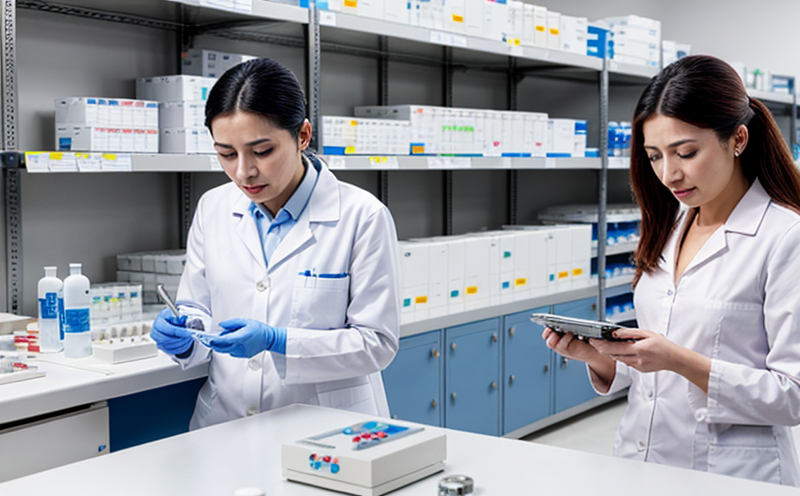USP Filter Integrity Testing
USP Filter Integrity Testing is a critical procedure in pharmaceutical quality control that ensures the integrity and functionality of filters used in various stages of drug manufacturing. The United States Pharmacopeia (USP) sets stringent standards for filter integrity testing to ensure that these filters are capable of retaining particulates or microorganisms effectively, thereby protecting the end product from contamination.
The process involves several key steps including specimen preparation, filtration, and then validating the filter's performance by using techniques such as Bubble Point Testing (BPT), Pressure Decrement Test (PDT), and Ammonia Penetration Testing. These tests are designed to confirm that the filter is performing its intended function without any defects or breaches.
For specimen preparation, it is crucial to use a solution with known particle size distribution. This ensures accurate testing results as particles in the solution mimic what might be present during the manufacturing process. The filtration step involves passing this prepared solution through the filter at specified pressure and flow rates. Afterward, integrity tests are conducted to check if there has been any leakage or breach.
The choice of technique for testing depends on various factors including the type of filter being tested and its intended use in drug manufacturing processes. For instance, BPT is used primarily for hydrophilic filters while PDT works well with both hydrophilic and hydrophobic types. Ammonia Penetration Testing provides additional assurance by simulating real-world conditions more closely.
Accurate testing results are vital for maintaining high standards of pharmaceutical quality control. Any breach in filter integrity could lead to contamination, which poses significant risks not only to the product but also to patients who consume it. Therefore, ensuring proper implementation and interpretation of these tests is paramount. Compliance with relevant guidelines such as USP 1207 (Q5C) helps manufacturers meet regulatory requirements and enhances overall trust in their products.
Understanding the importance of this testing process can help stakeholders make informed decisions about which methods to employ based on specific needs. By adhering strictly to established protocols, laboratories like Eurolab can provide reliable and accurate results that contribute significantly towards maintaining pharmaceutical quality standards globally.
Industry Applications
| Application Area | Description |
|---|---|
| Pharmaceutical Manufacturing | Ensuring that filters used in production lines meet strict particle retention requirements to prevent contamination. |
| Biopharmaceutical Processing | Guaranteeing the safety and efficacy of biologics by maintaining sterile conditions throughout processing stages. |
| Cosmetics & Personal Care Products | Avoiding impurities that could adversely affect product quality or cause irritation in sensitive skin types. |
| Medical Device Manufacturing | Preventing microbial contamination which can lead to serious health issues when devices come into contact with bodily fluids. |
| Application Area | Description |
|---|---|
| Food & Beverage Industry | Maintaining purity levels during filtration processes to ensure compliance with health and safety regulations. |
| Agricultural Chemicals Production | Protecting formulations from microbial intrusion that could reduce shelf life or effectiveness of pesticides. |
| Environmental Monitoring | Identifying potential leaks in water treatment systems to safeguard public health and safety. |
Eurolab Advantages
EuroLab brings years of experience and expertise to USP Filter Integrity Testing, ensuring accurate and reliable results every time. Our state-of-the-art facilities are equipped with cutting-edge equipment that allows us to perform comprehensive tests under controlled conditions.
Our team of qualified professionals adheres strictly to international standards such as USP 1207 (Q5C) when conducting these assessments, guaranteeing compliance with regulatory requirements. This not only enhances the credibility of our findings but also builds trust among clients and stakeholders.
We pride ourselves on offering prompt turnaround times without compromising on quality. By leveraging advanced technology and methodologies, we can deliver quick yet thorough reports that meet client expectations efficiently. Furthermore, our commitment to continuous improvement ensures that we stay at the forefront of industry practices, adopting new techniques as they become available.
At EuroLab, we understand the importance of maintaining pharmaceutical quality standards globally. Our rigorous testing procedures and adherence to regulatory guidelines help manufacturers protect their reputation while ensuring patient safety above all else. Partnering with us means gaining access to a team dedicated to excellence in every aspect of our work.
Environmental and Sustainability Contributions
Incorporating USP Filter Integrity Testing into your quality control protocols can contribute positively towards environmental sustainability. By ensuring that filters are functioning optimally, you minimize waste generation during manufacturing processes. This leads to reduced resource consumption and lower carbon footprints associated with production activities.
Furthermore, by preventing contamination in pharmaceutical products through thorough testing, you reduce the likelihood of recalls or returns which would otherwise require additional resources for reprocessing or disposal. This contributes significantly towards reducing overall environmental impact throughout the lifecycle of a product.
EuroLab supports these efforts by providing comprehensive training and support to clients on best practices related to filter integrity testing. We believe that educating our industry partners about sustainable manufacturing methods is key to promoting long-term environmental stewardship.





